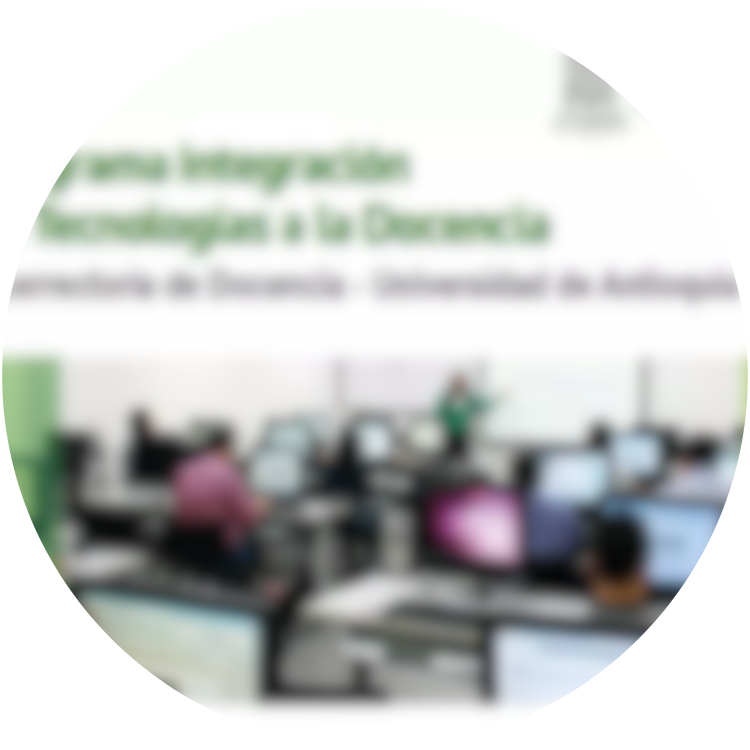Integración TIC en la Universidad de Antioquia
un rompecabezas por armar
Palabras clave:
Virtualidad, Universidad de Antioquia, Integración de TecnologíaResumen
Este artículo busca recuperar y sistematizar la historia de las principales iniciativas de integración de tecnologías a la educación que han surgido en la Universidad de Antioquia. A pesar de que el tema es de gran importancia para la innovación educativa y el mejoramiento de los procesos formativos de la segunda universidad pública más grande de Colombia, dentro de la institución no se conoce ni reconoce el trabajo de dichas iniciativas desde hace más de treinta años. Las indagaciones muestran que aunque varios proyectos se han dado de manera independiente, comparten procesos y objetivos que permiten compartir aprendizajes y construir colaborativamente una “unidad en la diversidad”. Sistematizar la historia de estas cinco iniciativas fue la oportunidad de conocer de fuentes primarias –personales y documentales– cuáles fueron las circunstancias y hechos que marcaron la ruta de cada uno de estos proyectos, que en algunos casos surgieron de la investigación, en otros de la extensión y en otros como necesidad de cualificación docente y ampliación de cobertura.
Descargas
Citas
Castells, Manuel. (2010). El poder en la sociedad red. Comunicación y poder. Madrid: Alianza Editorial.
Jenkins, Henry; Ito, Mizuko y Boyd, Danah. (2016). Participatory Culture in a Networked Era: a Conversation on Youth, Learning, Commerce, and Politics. Hoboken, Nueva Jersey: Blackwell Publ.
Gros, Begoña y Silva, Juan. (2005). La formación del profesorado como docente en los espacios virtuales. Revista Iberoamericana de Educación, 36 (1).
Levy, Pierre. (1997). Collective Intelligence. Cambridge, MA: Perseus Books.
Mesa, Fredy. (2012). Las Tecnologías de la Información y la Comunicación en la Universidad Colombiana: Evolución y Prospectiva. Revista de Historia de la Educación Latinoamericana, 14 (19), 71-90.
Moreira, Manuel; Gros, Begoña y Marzal, Miguel. (2008). Alfabetizaciones y tecnologías de la información y la comunicación. Madrid: Editorial Síntesis.
Pardo, Hugo y Cobo, Cristóbal. (2020). Expandir la Universidad más allá de la enseñanza remota de emergencia. Ideas hacia un modelo híbrido post-pandemia. Barcelona: Outliers School.
Plan de Desarrollo de la Universidad de Antioquia, 2017-2027 [En línea]. Universidad de Antioquia. Disponible en: http://www2.udea.edu.co/webmaster/multimedia/plan-desarrollo-udea/index.html#:~:text=El%20Plan%20de%20Desarrollo%20de,geogr%C3%A1ficos%20en%20los%20que%20participa.
Selwyn, Neil. (2013). Internet y educación. Cambio. 19 ensayos fundamentales sobre cómo internet está cambiando nuestrasvidas. Madrid: Open Mind BBVA.
Wenger, Etienne y Snyder, William. (2000). Communities of practice: The organizational frontier. Harvard Business Review, 78, 139-145.

Descargas
Publicado
Cómo citar
Número
Sección
Licencia
Derechos de autor 2023 Folios, revista de la Facultad de Comunicaciones y Filología

Esta obra está bajo una licencia internacional Creative Commons Atribución-NoComercial-CompartirIgual 4.0.
Los documentos deberán ser inéditos y no podrán ser sometidos a consideración simultánea de otras publicaciones. Los textos enviados tampoco pueden estar publicados en un sito web y de ser así el autor, una vez aprobada su publicación en FOLIOS, debe comprometerse a retirar el artículo del sitio web donde sólo quedará el título, el resumen, las palabras clave y el hipervínculo de la revista. Para el caso de las traducciones la revista le exigirá una carta al traductor donde conste que el autor original y la editorial, donde ha sido publicada previamente, le han cedido los derechos de publicación del artículo y cuya consecución es exclusiva responsabilidad del traductor.









